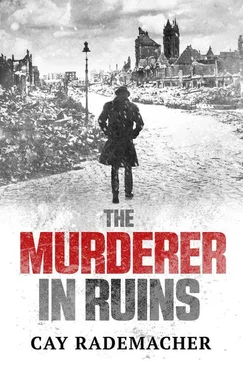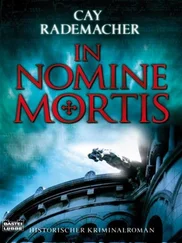Cay Rademacher - The Murderer in Ruins
Здесь есть возможность читать онлайн «Cay Rademacher - The Murderer in Ruins» весь текст электронной книги совершенно бесплатно (целиком полную версию без сокращений). В некоторых случаях можно слушать аудио, скачать через торрент в формате fb2 и присутствует краткое содержание. Год выпуска: 2015, ISBN: 2015, Издательство: Arcadia Books Limited, Жанр: Триллер, на английском языке. Описание произведения, (предисловие) а так же отзывы посетителей доступны на портале библиотеки ЛибКат.
- Название:The Murderer in Ruins
- Автор:
- Издательство:Arcadia Books Limited
- Жанр:
- Год:2015
- ISBN:9781910050750
- Рейтинг книги:5 / 5. Голосов: 1
-
Избранное:Добавить в избранное
- Отзывы:
-
Ваша оценка:
- 100
- 1
- 2
- 3
- 4
- 5
The Murderer in Ruins: краткое содержание, описание и аннотация
Предлагаем к чтению аннотацию, описание, краткое содержание или предисловие (зависит от того, что написал сам автор книги «The Murderer in Ruins»). Если вы не нашли необходимую информацию о книге — напишите в комментариях, мы постараемся отыскать её.
The Murderer in Ruins — читать онлайн бесплатно полную книгу (весь текст) целиком
Ниже представлен текст книги, разбитый по страницам. Система сохранения места последней прочитанной страницы, позволяет с удобством читать онлайн бесплатно книгу «The Murderer in Ruins», без необходимости каждый раз заново искать на чём Вы остановились. Поставьте закладку, и сможете в любой момент перейти на страницу, на которой закончили чтение.
Интервал:
Закладка:
‘If…’
The two men turned to go. Stave opened his notebook and mentioned his little detour to the Search Office and read them the few details concerning Dr Martin Hellinger.
‘I’m going to pay a visit to his wife.’
Maschke turned and stared at him blankly. ‘I can’s see how that’s going to help us,’ he said.
MacDonald had reddened. For a moment Stave thought the missing man’s name had meant something to him. But then he noticed that the Brit had already opened his office door a fraction and was glancing at Erna Berg, who was standing with her back to them sorting out folders on a shelf. Happy and in love, Stave thought, feeling the needle of envy prick his heart. ‘I shall drop by Hellinger’s wife in the morning,’ he told them.
‘Will you need me with you?’ Maschke asked dismissively, making quite clear what he thought of the idea.
‘No,’ the chief inspector answered, not exactly devastated. ‘What about you, Lieutenant?’
MacDonald was still blushing. ‘I’m afraid I have a meeting tomorrow morning.’
A ‘meeting’ with Erna Berg, my secretary and a married woman, Stave thought, but he forced a smile.
‘Very well then. I shall go on my own. Just to dot the “i”s and cross the “t”s.’
A Witness and a Piece of Paper
Wednesday, 5 February 1947
Stave stared out through the iced-up windows of his apartment. It was early morning. There was no point in going into the office, only to come all the way back to Marienthal to speak with the missing man’s wife. On the other hand he could hardly ring her doorbell at 6 a.m. the way the Gestapo used to do. So instead he sat there counting the crystals on the thick ice in the middle of his windowpane, then breathed on it, trying in vain to ignore the cold and the pain in his leg.
Gradually the grey day dawned. At long last he got to his feet. If he walked slowly he wouldn’t be there before 8 a.m. – and in this weather nobody was still asleep by then.
Marienthal was a Shangri-la, a district of villas in the east of Hamburg only a few hundred paces from the rental block Stave lived in. The Allies had never attacked Marienthal; only the rare stray bomb had landed there.
Stave wondered along Ahrensburg Strasse towards the centre of the district. Grey light, passers-by who avoided one another. Nobody glanced at anybody else. Nobody walked next to the ruins even though they sometimes provided shelter from the icy wind.
He stopped by an advertising column to examine his department’s handiwork: a ‘wanted’ poster, put up early that morning. ‘5,000 Reichsmarks Reward!’ And the photos of the three victims. The words beneath read: ‘A murderer is at large. A monster in human form.’ Then there was a description of the victims and where they were found. ‘Has nobody missed any of these people? Can people simply disappear in this city without family, friends or acquaintances caring?’ Did I really write that, Stave wondered. I must have been tired.
There was a tiny park by the edge of the road, scarcely bigger than a domestic garden: cobblestoned paths, trees and bushes hacked down to stumps, the skeletons of two benches, their wooden seats long since stolen.
Stave turned into Eichtal Strasse, townhouses on other side, two stories, with a loft and a gable wall facing the street. Every house was that little bit different: some faced in red brick, others with white or yellow plasterwork, or covered with ivy. Chestnut trees and beeches grew from amongst the cobbles, some chopped down, some still standing. His footsteps sounded loud on the stone. Five hundred metres away, Margarethe had been burned to death. And yet here everything was still as it ever was.
A small untended front garden under a layer of dirty hoar frost. Behind it a villa. A few dirty streaks on the white plaster, one window knocked askew. Otherwise in good condition. A thin, blackish grey trail of smoke from the chimney, the bitter but oh-so-sweet stink of glowing coal. All of a sudden Stave was in a hurry to get indoors.
The doorbell made no sound, so he knocked. It took a while, but eventually the door opened. A wave of warm air washed out, causing the chief inspector to shiver involuntarily. A woman in her fifties, grey streaks in her long dark hair, a soft face, brown doe eyes, in an elegant if somewhat worn housecoat.
Stave presented his ID, gave her his name.
Frau Hellinger hesitated for a moment, then gave a shy smile and invited him in. Parquet floors, antique dressers, blank spaces on the four walls where once pictures must have hung. Stave realised how the Hellingers had paid for their coal. His host led him to the rear of the house, to a room with a bay window looking out on to a quiet garden. She offered him a wicker chair.
‘Would you like a cup of tea?’ she asked. Stave nodded gratefully.
‘I hadn’t reckoned on the police calling by,’ she said.
Stave gave a thin smile. ‘Why’s that?’
‘I originally reported my husband as missing at the nearest police station. An officer there took down my details on a form. And I had the impression that that was that.’
‘Which is why you went to the Search Office?’
She nodded, sipping at her tea, her hands shaking ever so slightly.
‘Tell me something about your husband,’ Stave brought out his notebook.
‘My husband is primarily a builder and engineer,’ Frau Hellinger said, with another shy smile. ‘He founded his own company as a young man. Nothing big, you know, but solid. A company that made specialist machines.’
‘What sort of machinery?’
‘Trigonometric calculators. Primarily for U-boats.’
She noticed Stave staring at her blankly, and held up a hand apologetically.
‘It was his own invention. As far as I understand it, U-boat captains have to make complicated calculations before firing a torpedo. They have to work out their own course, and that of the ship they intend to attack, the speed of the ships, the speed of the torpedo, currents, all that sort of thing. My man made calculators that could help them work it all out. The officer would put in some data, turn a few wheels – and there was the result. It was a bit like a calculating machine you get in offices, my husband used to say, but more complicated. He delivered the devices to Blohm amp; Voss and the shipyards installed them in every U-boat that left the port here.’
‘A good business to be in, I imagine,’ said Stave. ‘At least up until May 1945.’
She gave him a pained look. ‘After the…’ she struggled to find a suitable word, ‘…collapse, despite the great problems, my husband managed to keep the firm together.’
‘Most of the ships sunk by U-boats were English. I can’t imagine that the new masters of our city were particularly interested in the welfare of a company that sent half their fleet to the bottom of the ocean.’
Frau Hellinger coughed. ‘Obviously my husband immediately stopped production. Machinery was machinery. That’s what he said. He didn’t care much what he produced – as long as it was complicated enough to keep him interested.’
‘What does the firm make nowadays?’
‘Precision timepieces, time clocks for offices and factories. Timers for automated machinery.’
‘There’s a market for those again?’
‘Of course, lots of firms are trying to get production up and running again, despite all the problems. You’ll even find our clocks hanging on the walls of the British barracks and clubs.’
That’s what it’s like to be a winner, thought Stave, and felt suddenly as if there were a wet leather overcoat weighing down his arms and shoulders. No matter who wins wars: winners do business. They have the bread, literally. They live in villas. The only difference here is that normally they do not vanish without trace.
Читать дальшеИнтервал:
Закладка:
Похожие книги на «The Murderer in Ruins»
Представляем Вашему вниманию похожие книги на «The Murderer in Ruins» списком для выбора. Мы отобрали схожую по названию и смыслу литературу в надежде предоставить читателям больше вариантов отыскать новые, интересные, ещё непрочитанные произведения.
Обсуждение, отзывы о книге «The Murderer in Ruins» и просто собственные мнения читателей. Оставьте ваши комментарии, напишите, что Вы думаете о произведении, его смысле или главных героях. Укажите что конкретно понравилось, а что нет, и почему Вы так считаете.











